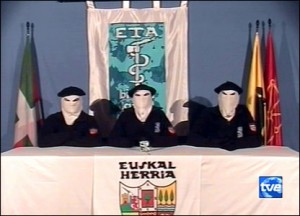
ETA’s latest ceasefire announcement may have captured the headlines, but it did not surprise anyone who has been following Spanish politics in recent months. Pressure has been building on the group to offer a convincing sign that it is committed to peaceful politics ever since it declared in the vaguest of terms on September 5 that it had ceased “offensive armed actions”.
Much of that pressure has come from ETA’s own political support, the izquierda abertzale. Arnaldo Otegi, the most visible figure within that collective, is one of many key players who have stressed the need for the terrorist group to end its campaign of violence. In addition, there has been a degree of coercion on an international level. South African human rights lawyer Brian Currin has spearheaded attempts to encourage ETA to go down the road of peace –and for Spanish authorities to welcome such a move- with the support of signatories such as John Hume and F. W. De Klerk.
The January 10 statement -issued to Basque newspaper Gara and accompanied by a video of three masked ETA members, one of them reading the text- declared a “permanent and general ceasefire, which will be verifiable by the international community”. The wording has more purpose and a greater ring of commitment to it than the September 5 statement: the ceasefire needs to be “permanent” to be taken seriously; “general” suggests the termination of all terrorist acts, including the extortion that was reportedly continuing after the September announcement; and “verifiable” is perhaps the most encouraging word of all, pointing to the laying down of weapons in the long term.
And while we wait for this latest peace to unfold there will be plenty of time to consider what the announcement and the events of the previous months tell us about ETA. The most obvious answer is that the organisation has descended into a spiral of incompetence and isolation that has left it looking divided, out of touch and slow to respond to events.
Otegi and others within the izquierda abertzale digested the blindingly obvious messages of recent years. Developments such as the increase in Islamist terrorism and the successful Northern Ireland peace process encouraged them and many other Basque nationalists to see Western Europe’s last armed separatist group as an anachronism. The 2006 ceasefire appeared to show ETA itself had understood this too, until it ended the truce by bombing Madrid airport and killing two people.
That attack virtually exhausted any credibility ETA may have still had in the eyes of Spanish public opinion and mainstream political parties with regard to a serious, negotiated peace. Meanwhile, its logistical weakness was laid bare as Spanish and French police made a seemingly endless string of arrests of senior leaders and weapons seizures. A botched car robbery in France in March 2010 saw the group shoot and kill a French policeman for the first time in its history – yet another disastrous blow to its image and one which stiffened French resolve to clamp down on it.
That is the only killing ETA has carried out in the last 18 months. However, its litany of errors has continued. A series of unclear, euphemism-ridden declarations are an obvious example, such as the weak September “ceasefire”, which drew suspicion and disdain from Spaniards, rather than celebration. That announcement also dilutes much of the impact of this latest one, despite its stronger language.
All of that reflects another problem ETA has: the increasing chasm that now separates it from its political support, which is taking the initiative and hoping to take part in May’s Basque municipal elections. There are also schisms within the organisation itself that impede it from acting coherently and decisively when circumstances demand.
So the announcement of this “permanent and general ceasefire” is welcome but hardly cause for euphoria. If the Basque Country is heading definitively towards the end of violence, it will be a long and complex process. ETA’s recent record shows it to be a clumsy organisation that is unable to move with the times. The only way it can prove itself to be otherwise is by bringing an end to its own existence.
Leave a Reply
You must be logged in to post a comment.